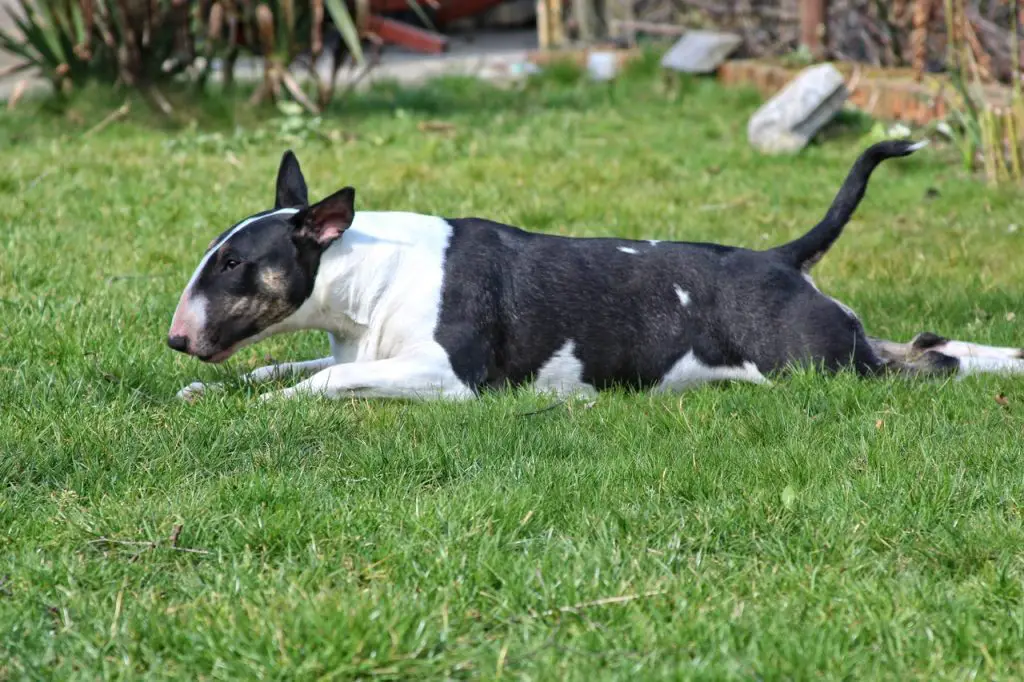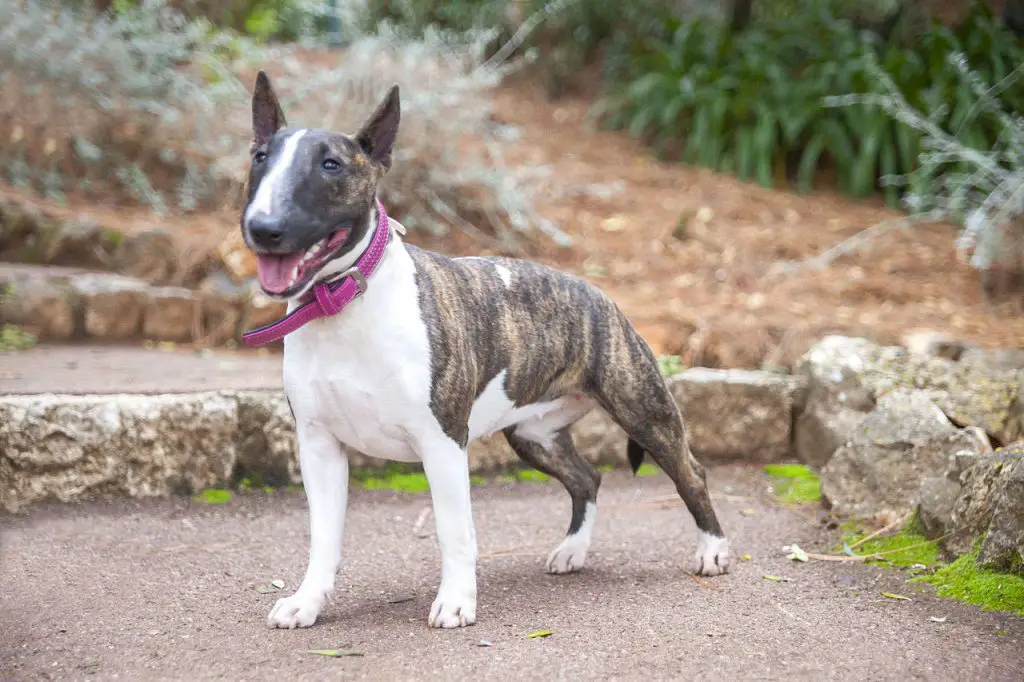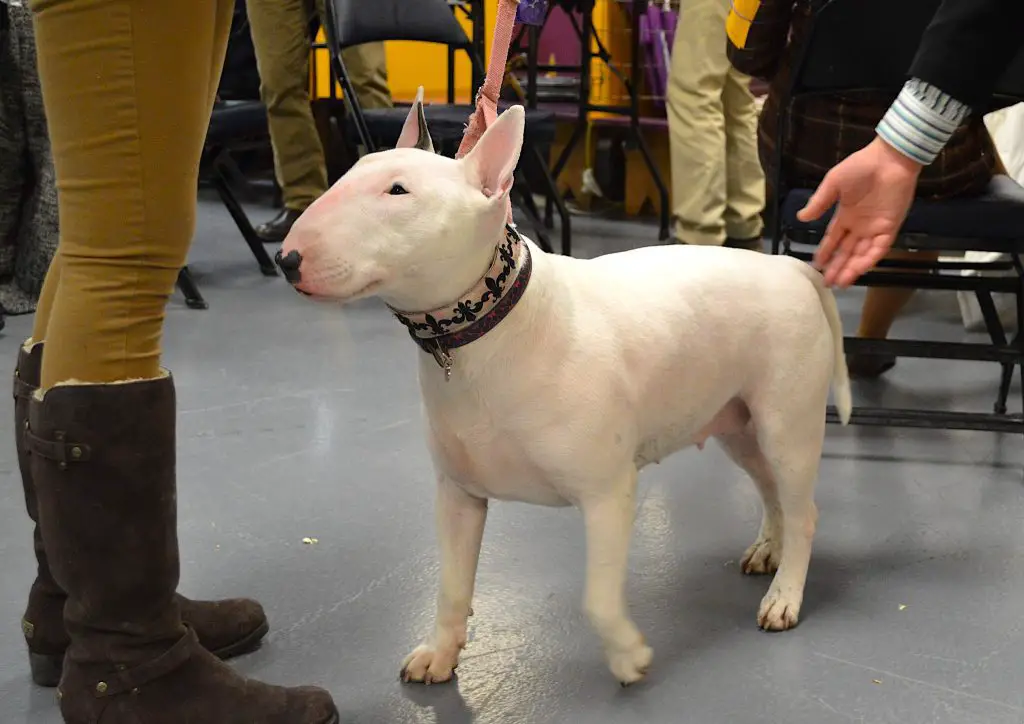Do you own a Bull Terrier? If so, then you know that they have an interesting smell. But do you know why they smell the way they do?
In this blog post, we will discuss the surprising reason why Bull Terriers smell the way they do!
Key Takeaway
- Bull Terriers may have a distinctive smell due to their increased sweat production compared to other breeds, outdoor activities that can get them damp, potential anal gland issues, or conditions like Canine Seborrhea, which can cause a musty odor.
- Bull Terriers can have a noticeable odor due to various health issues such as skin infections, anal gland problems, and ear infections, or due to environmental factors like outdoor activities that get them dirty.
- Health problems that can make a Bull Terrier smell bad include skin infections, anal gland problems, ear infections, periodontal disease, allergies causing skin itching and secondary infections, and yeast infections.
Why Do Bull Terriers Smell?

One of the reasons for the musky smell is that bull terriers have a high level of sebum in their skin. Another reason for the musky smell is that Bull Terriers produce more sweat than most other breeds of dogs.
This sweat contains a high level of urea, which is a compound that is also found in urine. This combination of sebum and sweat gives bull terriers their characteristic smell.
Sebum is a naturally occurring oil that is produced by the sebaceous glands in the skin. It helps to keep the skin moisturized and can also help to protect it from infection. The smell of sebum is often described as earthy or musky.
The amount and type of sebum that is produced by a Bull Terrier can affect how their coat smells. Dogs that have high levels of sebum will often have a stronger, more pungent smell than those with lower levels. Sebum production can also be affected by diet, age, and gender.
Male Bulldogs tend to produce more sebum than females, which can result in a stronger odor. Diet can also play a role in how a Bull Terrier smells. Foods that are high in fat or protein can cause the dog’s sebum to become more oily and pungent.
While there is no way to completely eliminate the smell of sebum, keeping your Bull Terrier’s coat clean and groomed can help to reduce it. Regular bathing and brushing will help to remove any dirt or debris that may be trapped in the hair follicles.
It is also important to keep the dog’s bedding and environment clean, as this can contribute to odor build-up.
Do Bull Terriers Smell Bad?

Not really. Many people think that bull terriers smell bad, but this is not actually the case. While they may have a bit of an odor, it is nothing too strong and certainly nothing that should stop someone from owning one of these dogs.
In fact, many people find the smell to be rather pleasant, especially when compared to some of the other breeds out there.
One of the reasons why bull terriers don’t smell bad is because they have a low number of sweat glands. Bulldogs, on the other hand, have a high number of sweat glands, which is why they tend to smell more.
Additionally, bull terriers have short hair coats, which also help to keep them from smelling bad. Lastly, their diet contributes to their lack of odor.
Bull terriers eat mostly dry food, which doesn’t produce as much body odor as wet food does. Wet dog food has a higher content of animal proteins and fats, which leads to an increase in body odor. So overall, there are several factors that contribute to the fact that bull terriers don’t smell bad says AKC.
If your Bull Terrier starts to smell bad, do this:
- Make sure they are groomed regularly. This will help remove any dirt or bacteria that can cause them to smell bad.
- Bathe them regularly, using a gentle dog shampoo. Be careful not to get the shampoo in their eyes.
- Ensure they have plenty of fresh water to drink and access to clean areas where they can relieve themselves. This will help reduce the amount of urine and feces that can cause odor.
- If your Bull Terrier starts to smell bad, take them to the vet for a check-up. There may be an underlying medical issue causing the smell.
Which Health Problems Can Make A Bull Terrier Smell Bad?

Bull Terriers can develop a bad smell due to several health problems such as skin infections, anal gland issues, ear infections, periodontal disease, allergies, and yeast infections.
Skin Infections
Bull Terriers are prone to skin infections which can cause them to smell. The bacteria on their skin can multiply excessively due to various reasons like poor hygiene, an underlying health condition, or an injury, leading to a foul odor.
Anal Gland Issues
Anal gland problems are common in Bull Terriers and can result in a strong and unpleasant smell. These glands can become impacted or infected, causing discomfort and a distinctive odor.
Ear Infections
Ear infections can also make a Bull Terrier smell bad. These infections, often caused by bacteria or yeast, produce a foul-smelling discharge that is noticeable and unpleasant.
Periodontal Disease
Periodontal disease, a common dental issue in Bull Terriers, can lead to bad breath. This condition involves the inflammation and infection of structures around the teeth including the gums, ligaments, and bone.
Allergies
Allergies can cause Bull Terriers to itch and scratch, damaging their skin and making it vulnerable to bacterial and fungal infections which can cause a bad smell.
Yeast Infections
Yeast infections, particularly on the skin or in the ears, can result in a musty, unpleasant smell. This is due to the overgrowth of yeast organisms that are normally present on the skin in small numbers.
Do Bull Terriers Like Baths?
Yes, Bull Terriers like baths. But there’s more to it than that. Bull terriers are bred for their athleticism and strength, so they need a good bath to help keep them clean and healthy.
Not only will a bath help get rid of dirt and dust, but it will also help remove any bad smells from your dog’s fur.
Baths can be especially helpful in the summertime when dogs tend to get sweaty and stinky. A good bath will help cool your dog down and make him or her smell a lot better.
Generally speaking, it is recommended that most dogs be bathed every two to four weeks. Bulldogs, Schnauzers, and other breeds with curly hair may need to be bathed more often than this, while Labs or other short-haired breeds may only need a bath every six to eight weeks.
Puppies and senior dogs also typically require less frequent bathing than adult dogs in the prime of their lives.
There are a few things to keep in mind when bathing your Bull Terrier. Make sure that you use a canine-specific shampoo that is pH-balanced and will not dry out your dog’s skin. Also, be sure to rinse your dog thoroughly after bathing – any leftover soap or shampoo can cause skin irritation.
Bathing your Bull Terrier too often can strip away the natural oils that keep his skin healthy, so it is important to strike a balance between keeping him clean and avoiding over-bathing. With a little bit of trial and error, you’ll figure out the right bathing schedule for your furry friend.
FAQs
Q: Does all bull terriers have a strong smell?
A: While not all bull terriers have a strong smell, it is common for them to have a slightly stronger odor compared to other dog breeds. This is due to their skin and unique coat.
Q: Can the smell of a bull terrier be reduced?
A: Yes, the smell of a bull terrier can be reduced through regular grooming. Bathing them with a mild dog shampoo and brushing their coat can help remove excess oils and dirt that contribute to the smell.
Q: Is the smell of bull terriers related to their diet?
A: The smell of bull terriers can be influenced by their diet. Feeding them a high-quality dog food that is free from artificial additives and fillers can help reduce the smell. Additionally, adding Omega-3 fatty acids to their diet may also help improve their skin and reduce odor.
Q: How often should I bathe my bull terrier?
A: It is recommended to bathe your bull terrier every 4 to 6 weeks. Over-bathing can strip their skin of essential oils, leading to dryness and potentially worsening the odor.
Q: Are there any specific grooming tips for bull terriers?
A: Yes, when grooming a bull terrier, it is important to pay attention to their wrinkles and ears. These areas are prone to collecting dirt and moisture, which can contribute to the smell. Regularly cleaning and drying these areas can help prevent odor buildup.
Q: Can allergies or skin conditions cause a stronger smell in bull terriers?
A: Yes, allergies or skin conditions can cause a stronger smell in bull terriers. If you notice an unusually strong or persistent odor, it is advisable to consult a veterinarian for a proper diagnosis and treatment.
Q: Are there any home remedies to reduce the smell of bull terriers?
A: While there are home remedies suggested by some dog owners, it is important to consult with a veterinarian before trying any remedies. They can provide guidance and recommend safe and effective options to mitigate the smell.
Q: Can bathing my bull terrier too frequently worsen the smell?
A: Yes, bathing your bull terrier too frequently can worsen the smell. Over-bathing can strip away the natural oils from their skin, causing it to become dry and potentially leading to an overproduction of oils, thus exacerbating the smell.
Q: Does neutering or spaying a bull terrier affect their smell?
A: Neutering or spaying a bull terrier does not directly affect their smell. However, it is worth noting that hormonal changes after the procedure may impact the oil production of their skin, which could potentially alter their smell.
Conclusion and final thoughts
In conclusion, it’s important to understand that while bull terriers may have a reputation for being smelly, the root cause of their odor can often be traced back to poor hygiene or underlying health issues.
It’s vital for owners to regularly groom and clean their bull terriers in order to keep them smelling fresh and healthy.




